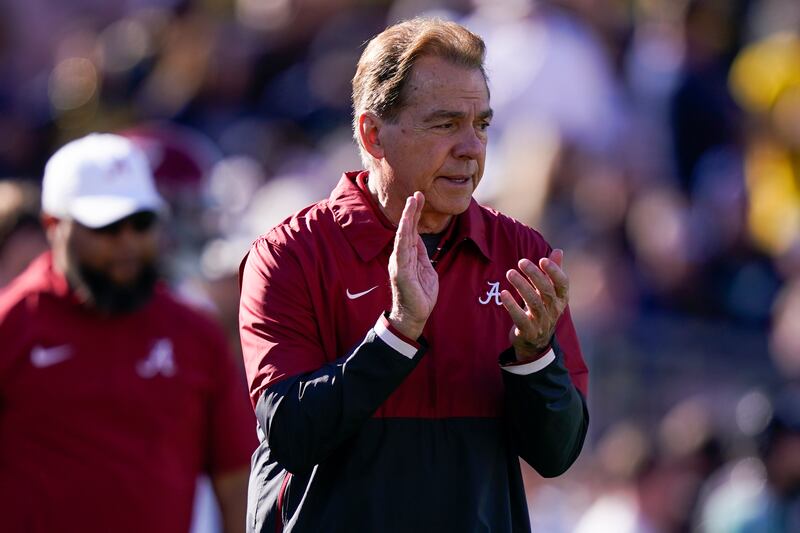The biggest problem in college football is the people who run it.
There are no people who run it.
Nobody’s in charge.
There are a few guys in the Midwest — the once mighty tyrants known as the NCAA — who were formerly in charge and probably still think they run things. They don’t. If you pull back the curtain you’ll find Oz-like characters pulling levers in the back room, but it’s only an illusion. They’re not doing anything.
The NCAA used to get out a measuring tape to determine if a slice of pizza a coach bought for a player was worth a one- or two-year sanction. Now they’re twiddling their thumbs waiting for the basketball season to heat up. They got what they deserve. The NCAA resisted change every step of the way, from televising games (no, really) to holding a playoff of any kind to allowing a few minor player benefits.
So they were pushed aside.
Eventually, their power was usurped by conference commissioners, school presidents and TV.
Welcome to college football’s middle ages, where the kingdom has been divided into various fiefdoms that wrestle for control of their corner of the world, gobbling up each other with hostile takeovers and acting only in self-interest.
What college football lacks — what it needs — is a central government, one that oversees the overall well-being of the game for every school.
What college football needs is a commissioner.
“I think one of the most important things that we can do is, let’s get a commissioner of college football that is waking up every single morning and going to bed every single night, making decisions that’s in the best interest of college football,” Penn State head coach James Franklin told The Associated Press.
It’s an idea that is long overdue.
Duke coach Manny Diaz not only supports the idea of a commissioner, he has a candidate in mind: former Alabama coach Nick Saban.
“I think Coach Saban would be phenomenal as commissioner,” Diaz told Michael Katz of the Daily Journal. “But it doesn’t matter who the commissioner is, you have to give the guy power. And right now the power is with the leagues. And if everybody wants to get in the sandbox and play nice and let someone be in charge of it, that would be the best thing. Right now no one is showing that they’re willing to let somebody create consensus, and I think that’s what’s hurting our game.”
Ole Miss coach Lane Kiffin agreed, saying Saban “genuinely has the best interest for the game and the kids.”
A commissioner’s first order of business would be to rein in the out-of-control excesses of the transfer portal and NIL. Kiffin and Diaz both lost players to the transfer portal before their teams met in the Gator Bowl. Diaz lost his top two quarterbacks and starting running back.
“It (college football) is just kind of all over the place … ‚” Kiffin told the Daily Journal. “I mentioned it before, like Manny’s situation, here goes your quarterback in the portal. We’re still playing. You would never create a system in professional sports that … would have free agency right at the end of the regular season before the postseason. With all the tampering that’s been talked about … it puts in the kids’ heads during the season that they’re going other places.”
Diaz, who proposes the replacement of spring football with summer training camp a la the NFL, said. “We don’t have to invent this. (The NFL) has already figured it out. It’s ludicrous, like Lane said, to have player movement while the season is going on. And the only reason that is the case is because kids want to be at the spring semester at their next stop. And why do they want to be there for the spring? They want to be there for spring practice. So if we can take away the incentive to move mid-term, we can finish the season.”
Everyone recognizes that the NIL and transfer portal are out of control, but no one does anything about it because no one is monitoring the greater good of the sport. It’s every conference and every school for itself. It’s the law of the jungle, ruled by the biggest and the strongest. That doesn’t work well in sports if they’re trying to maintain any degree of competitive integrity.
College athletes have more freedom of movement than professional athletes and can earn just about the same paycheck. They can play for three or four schools, the mid-major conferences serving as developmental leagues for the elite schools. The mid-major schools are farm teams for the Power Four conferences. They spend a year or two developing a player only to see him follow the NIL money to an elite school. It’s the haves vs. the have-nots.
It’s a professional game now; start acting like it. Hire a commissioner. Force athletes to sign contracts that bind them to a school for two or three seasons, and all the games therein, including bowl games. Adopt a salary cap that would put limits on how much NIL money schools can spend. Create a level playing field. The elite schools will resist it —they are enjoying the advantages of their wealth — but they must be overruled.
It all starts with hiring and empowering a commissioner, someone to watch over the health of college football as a whole.


